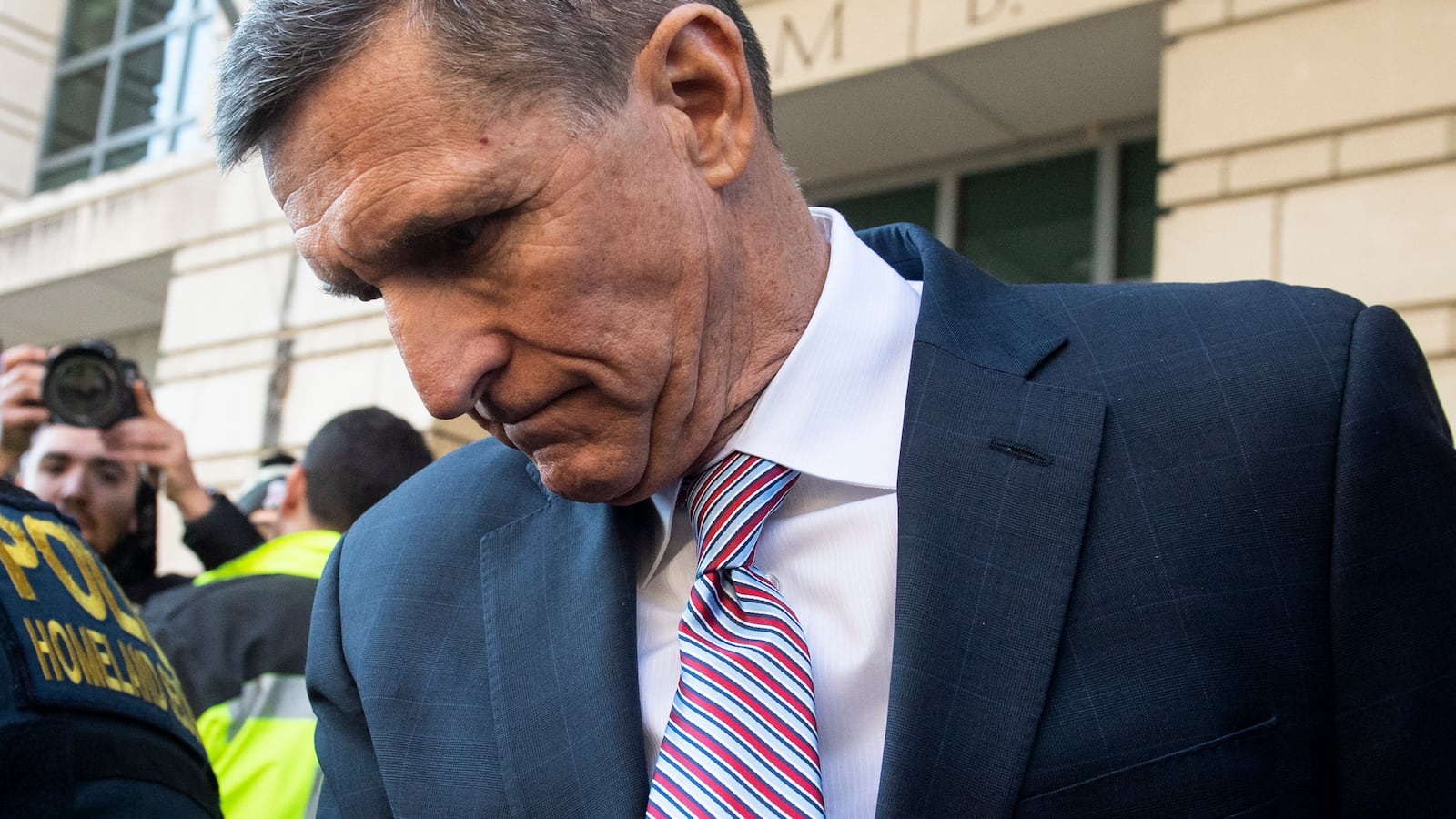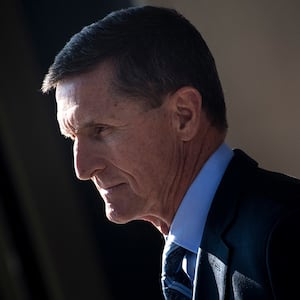It may not be a pardon. But the Justice Department has dropped charges against Donald Trump’s former national security adviser Michael Flynn, who pleaded guilty to lying to the FBI.
Retired Army Lt. Gen. Flynn, an important figure in the war on terror who gave Trump’s 2016 run military validation, will avoid prison time after the Justice Department provided a deliverance on Thursday that Flynn had long sought. It is also the second redemption that Trump has provided the general, who served as his first national security adviser for less than a month.
“The Government has determined, pursuant to the Principles of Federal Prosecution and based on an extensive review and careful consideration of the circumstances, that continued prosecution of this case would not serve the interests of justice,” wrote Timothy Shea, the interim U.S. attorney for the District of Columbia and a former senior aide to Attorney General William Barr. Shortly before the filing, lead prosecutor Brandon Von Grack abruptly withdrew from the case.
The Justice Department filing, in essence, portrays Flynn as the victim of an FBI frame-up job, and his lies to the FBI as legally marginal. Shea wrote that Flynn’s lies needed to have been “not simply false, but ‘materially’ false with respect to a matter under investigation.” Later in the filing, Shea referred to those lies as “gaps in [Flynn’s] memory,” rather than deliberate falsehoods Flynn conceded.
“Even if he told the truth, Mr. Flynn’s statements could not have conceivably ‘influenced’ an investigation that had neither a legitimate counterintelligence nor criminal purpose,” Shea wrote.
It was an astonishing turnaround since 2018, when a federal judge said to Flynn in a sentencing hearing, “arguably, you sold your country out.” That judge, Emmet Sullivan, could still decide to reject Shea’s filing and continue with Flynn’ sentencing. Michael Bromwich, a former federal prosecutor and Justice Department inspector general, tweeted that the extraordinary move represented “a pardon by another name” and called it a “black day in DOJ history.”
Rep. Jerrold Nadler (D-NY), chairman of the House Judiciary Committee, said the decision to drop charges was “outrageous” and revealed “a politicized and thoroughly corrupt Department of Justice.” Sen. Ron Wyden (D-OR) added, “If Barr’s Justice Department will drop charges against someone who twice pleaded guilty to lying to the FBI and who the White House publicly fired for lying to the vice president, there’s nothing it won’t do, no investigation it won’t taint.”
Neither Flynn nor his attorney, Sidney Powell, responded immediately to requests for comment.
Speaking to reports on Thursday afternoon, Trump said he had no prior knowledge of the Justice Department’s decision. “He was an innocent man,” Trump said, of Flynn. “Now in my book he’s an even greater warrior.”
The dropped charges follow a years-long groundswell from Trump’s base, and particularly Fox News, to clear Flynn. His advocates claim that Flynn was set up by the same disreputable FBI figures who they believe persecuted Trump over phantom collusion with Russia.
Flynn’s guilty plea, in December, 2017, has been no obstacle to the narrative, particularly since Flynn sought afterwards, unsuccessfully, to withdraw his plea. His sentencing, initially set for February, had also been delayed.
Last month, agitation for a Flynn pardon intensified after documents emerged from two of Trump’s most hated ex-FBI figures, counterintelligence official Peter Strzok and attorney Lisa Page, discussing Flynn’s fateful January 2017 interview with the FBI. Page asked when and how to “slip it in” to Flynn that lying to an FBI agent is a crime, something that Flynn’s advocates believed showed the general being railroaded from the start.
But veteran FBI agents and prosecutors have pointed out that the FBI is not legally obligated to inform an interview subject that lying to them is illegal. “Michael Flynn was very familiar with the FBI,” said Stephanie Douglas, a former executive assistant director of the FBI’s National Security Branch. “He would certainly have been aware of his obligation to provide candid and truthful information. His claim he was tricked and manipulated doesn’t sound valid to me.”
Shea, in his Thursday court filing, suggested the FBI officials were “fishing for falsehoods merely to manufacture jurisdiction over any statement.” In Shea’s view, Flynn’s lies were less germane to the prosecution than the FBI “lack[ing] sufficient basis to sustain its initial counterintelligence investigation,” and its pre-interview position that it ought to close the investigation before speaking with the then national security adviser.
Former FBI deputy head Andrew McCabe said on Thursday that the suggestion there was no reason to interview Flynn was “patently false, and ignores the considerable national security risk his contacts raised.” He said Flynn’s lies added to the FBI’s concerns about his relationship with Russia. “Today’s move... is pure politics designed to please the president,” he added.
U.S. Attorney Jeff Jensen, who was appointed by Barr to review Flynn’s and other high-profile cases, said on Thursday that he concluded “the proper and just course” was to dismiss the case. “I briefed Attorney General Barr on my findings, advised him on these conclusions, and he agreed,” he said.
While serving as national security adviser, Flynn misled FBI interviewers about conversations he had with the then-Russian ambassador, Sergei Kislyak. In one of those late 2016 conversations, according to court filings, Flynn asked the Russians to avoid escalatory actions in response to sanctions and diplomatic expulsions then President Barack Obama enacted as reprisal for Russian electoral interference. Shea, in his filing, called Flynn’s Kislyak calls “entirely appropriate on their face.”
The national security adviser’s lies prompted the holdover attorney general, Sally Yates, to warn the White House that Flynn had given the Russians leverage to blackmail him. But it would take weeks before Trump fired Flynn over “an eroding level of trust” concerning misleading Vice President Mike Pence on the Kislyak contacts. By May, Trump was said to have regretted dismissing the general.
Flynn in 2017 agreed to cooperate with Special Counsel Robert Mueller’s investigation. The general avoided charges for taking $530,000 in unregistered money from interests connected to the Turkish government—something he only declared with the Justice Department after his downfall as national security adviser.
During a sentencing hearing in 2018, a federal judge castigated Flynn for disgracing the uniform Flynn wore for three decades. “Arguably, you sold your country out,” Judge Emmet Sullivan said. Two years earlier, on stage at the Republican national convention, Flynn had led a chant of “lock her up” about Hillary Clinton. Protesters outside Flynn’s courtroom did not let the general forget it.
Trump’s enduring bond with Flynn is a testament to the importance of the role the general played in 2016.
A host of national security officials, many aligned with the Republican Party, rejected Trump in 2016 as unfit to be president owing to his nativism, his penchant for brutality and his benign view of dictators like Russia’s Vladimir Putin. Flynn was the exception. And the general was an exceptional figure. As the intelligence chief for the Joint Special Operations Command during the mid-2000s, Flynn is one of a select few people who can be said to have personally prosecuted the most sensitive missions of the war on terror.
It was a pivotal credential in another way. Flynn emerged from the war on terror endorsing Trump’s view that the security apparatus, abetted by hidebound liberals and cowardly conservatives, had neutered the war on terror by refusing to see it was a civilizational conflict with Islam. “Islam is a political ideology” that “hides behind this notion of being a religion,” Flynn told the Islamophobic group ACT for America shortly after the 2016 convention. His hostility to Islam informed his sanguine view of Russia, which both Flynn and Trump saw as naturally aligned with the U.S. against what they called “Radical Islamic Terror.”
It also meant that Trump and Flynn shared a common bureaucratic enemy. James Clapper, then the director of national intelligence, was a lead architect of an intelligence assessment finding Russia intervened in the election on Trump’s behalf. In 2014, Clapper fired Flynn as director of the Defense Intelligence Agency. It was deeply embittering. Just four years earlier, Flynn had been hailed as an innovator after claiming U.S. military intelligence had misunderstood the Afghanistan war.
While Flynn portrayed himself as a martyr, victimized by the ‘Deep State’ for daring to warn about radical Islam, Clapper and other intelligence leaders had fallen out with Flynn over what they considered an incompetent management style and an iffy relationship with the truth. Reportedly, Flynn believed Iran was involved in the 2012 assault on a CIA compound in Benghazi that killed four Americans, and claimed incorrectly that Iran was responsible for more American deaths than al-Qaeda. Aides referred to such untruths as “Flynn facts.”
Flynn facts did not disturb Trump. They validated his instincts on national security. Trump rewarded Flynn by making him national security adviser, one of the most important positions in the U.S. security apparatus. It was the first time Trump redeemed Flynn. Thursday’s dropped charges represent the second.








